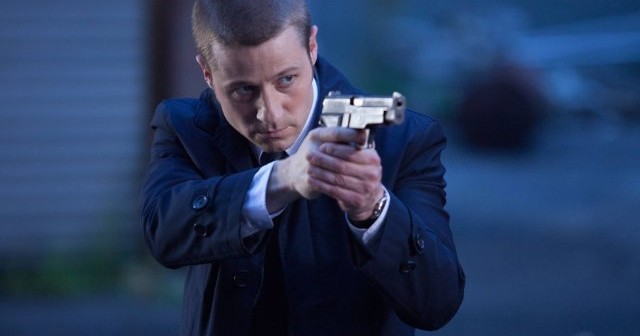The good news about “Mr. Freeze” is also bad news: It’s a decent episode, one of the first in what feels like a long while, but it doesn’t address what’s been wrong with this season. Violence still feels like a pseudo-adult, tonal cure-all that’s glibly trotted out whenever creators can’t make their villains tough without also being sadistic. And yes, the show is still very much all about the villains, as is indicated by the foregrounding of one of Batman’s famous super-baddies: Victor Fries (House of Cards’ Nathan Darrow), better known as the cold-gun-toting Mr. Freeze.
“Mr. Freeze” seems to be the first half of a two-part arc about Fries and his ailing wife, Nora (Kristen Hager), but the thematic parallels between Gordon and Fries’s respective dilemmas is also set up a number of times. Tonight, everybody thinks that being free of emotional attachments makes you free of anxiety and responsibility, as Edward Nygma explains in the episode’s “Previously On” segment. But that claim, as anyone who’s ever considered having a relationship with another person knows, is solipsistic bull-pucky. No, what makes “Mr. Freeze” work isn’t its big ideas, which are still fundamentally teensy. They’re just being expressed far more articulately than they have in the recent past. Change hasn’t come to Gotham, but eh, close enough.
“Mr. Freeze” begins where the mid-season finale left off: Jim Gordon has to answer for murdering Theo Galavan, but he doesn’t want to. He lies repeatedly to district attorney Harvey Dent when questioned, and insists he wasn’t involved in any way with Galavan’s death. Neither Dent nor Captain Nathaniel Barnes believe him, so Barnes uses the mysterious — and seemingly random — arrest of Oswald Cobblepot to let Gordon know that he’s not off the hook. But really, he is: Cobblepot doesn’t snitch, and consequently gets locked up in Arkham Asylum. For now, Gordon’s in the clear.
Again, that’s a good news/bad news thing. The good news is we don’t have to hear Jim Gordon fail to reconcile the difference between his bloody crimes and his goody-goody ideals. The bad news is, well, see last sentence. Gotham belongs to Gordon: He’s the broken moral compass that’s supposed to keep the city going during the dark times before Batman’s arrival. So while it make sense that Gordon is unable to be both ethically passionate and righteous, he has yet to face and atone for the mistakes he’s made this season. That presumably comes later. But for now, how many times can we forgive this guy? Why does he get to just move on to catching Victor Fries without any serious repercussions from Barnes, let alone himself? What the hell is going on with Jim Gordon that makes him so good at denying that murdering bad men is, y’know, bad?
You won’t get answers to any of those pointed rhetorical questions in “Mr. Freeze.” What you will get is a lot of gruesome violence, and a lot of fan service. Again, not such a bad thing given that both of those things are well-expressed, as far as cheap attempts at holding your attention go. Prosthetic-makeup designer David Presto earns his keep tonight with some memorably gruesome effects, particularly the melting bodies of Victor Fries’s victims. Presto’s admirably ghoulish work is abused, however, when it’s later revealed that Nigel, the inmate that chucked rotten fruit at Cobblepot’s head when he arrives in Arkham’s cafeteria, has clawed his own eyes out. But hey, that kind of cheap shock tactic is nothing Gotham fans haven’t already encountered — many more times than I care to admit, even!
The addition of more recognizable villains is similarly a quick-fix solution to a greater problem. But in “Mr. Freeze,” that’s okay. Fries’s tragic backstory — he freezes stuff with a megapowerful freezey-weapon in order to collect supplies to heal Nora’s illness — may be lifted from Batman: The Animated Series, the show that gave a sheen of pathos to a villain played by both Otto Preminger and Arnold Schwarzenegger. But this time, episode writer Ken Woodruff treads familiar ground with confidence, and Fries’s quest to cure his spouse (by killing other people) actually works. The show’s version of fan-favorite villain Hugo Strange (played by BD Wong) also works exceptionally well. Wong can make any sentence with an em-dash sing, like when Strange tells Cobblepot, “I know if I were in your position, I would be feeling some — strong emotions.” Wong is so good here that he makes you want to forget that Gotham’s second season has piled on familiar villainous faces without solving the show’s more pressing concerns: unbelievable characterizations, slack dialogue, weak acting, wild tonal shifts, and gruel-thin ideas. Yes, you’ll probably get to see a boatload of more villains before the season ends. But given the show’s persistent drawbacks, is that what you really want?
If anything, “Mr. Freeze” reminds us of how little Gotham’s creators seem to think of their audience. If showrunners Danny Cannon and Bruno Heller can simply patch things up with a few more villains and a lot of gore, why bother fixing what’s been wrong since season one? By finding a bit of success within that wonky formula, Woodruff and director Nick Copus haven’t accomplished much. In fact, their success sends a disheartening message to Cannon and Heller: Quit while you’re almost ahead and keep on failing upward. Something’s gotta give in Gotham, and fast.
source: http://www.vulture.com/2016/02/gotham-recap-season-2-episode-12.html

